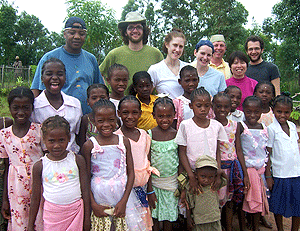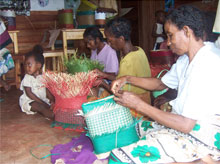It might seem odd that students in the middle of the United States could make a difference to a small village in a developing country halfway around the world, but that’s exactly what happened when five students from Washington University in St. Louis went to Madagascar.

They braved a 30-hour flight and a two-and-a-half day trek to a remote region on the southeastern edge of Madagascar, called Mahabo. The voyage was the second step in an ongoing effort by WUSTL students to uncover concepts that might impact some of the world’s most challenging problems. For this trip, the purpose was to balance economic, social, environmental and political factors in a 10-village area of about 9,000 rural Malagasy people.
The effort resulted from a partnership between the Missouri Botanical Garden, Washington University and the Blessing Basket Project, a non-profit company based in St. Louis that pays weavers in six developing countries prosperity wages that are 10-15 times higher than fair-trade levels.
The Missouri Botanical Garden has been involved in Madagascar for several years through its Center for Conservation and Sustainable Development. For the past four years, the garden has increased its connections with the Mahabo Commune.
The garden’s efforts have created more than 20 jobs, built a library, developed a plant nursery, constructed buildings and developed relationships with local leaders, which have helped restore the endangered littoral forest and its lemurs.
Despite its success, Botanical Garden staff realized they needed economic growth for these gains to be sustained. Enter Washington University’s School of Law and the Skandalaris Center for Entrepreneurial Studies, which were both asked for ideas.
The first goal was to marry conservation aims with sustainable economic growth to improve the quality of life in Mahabo; the second goal was to get perspectives that might lead to replicable approaches that could be applied in other Malagasy villages having similar environmental and economic issues.

The students had prepared for the trip for months by meeting with a broad cross section of faculty and doing independent research. Once on the ground, each student examined issues based on his or her area of study, including community rule of law, cultural and family issues, technology innovation potential, environmental impact and entrepreneurial economic development.
Beyond the Blessing Basket Project
In particular, the students studied the impact of the Blessing Basket Project in its first year of operating in Mahabo. They also were looking for ways to expand beyond Blessing Basket to find other benefits.
According to Russell Kohn, a math and economics senior in Arts & Sciences at Washington University, there was plenty of evidence that the Blessing Basket was improving conditions.
“The Blessing Basket Project has already made a huge difference in the village’s economy,” Kohn said. “I never imagined that so much could happen so quickly. The price of baskets has quintupled because of the new design that Blessing Basket developed, and then trained, weavers on. The Blessing Basket also is being used as a bargaining chip. Weavers now have a better product, and they use those products as leverage to get the big-city collectors to pay high prices.”
Teresa Wallace, a first-year MBA student who also has a master’s in social work, said the higher income was having a ripple effect on the economy.
“We were already seeing people being hired to help in the fields — that’s a sign of second-order development. We are seeing women investing their income in medication and children’s education,” Wallace said.
Mahabo residents have a good relationship with the Botanical Garden’s staff due to the years of their conservation work. As a result, the residents were very open to talking with the students and eager to learn new skills and ideas they could implement in their everyday lives.
“Our goal was to let the people choose what they needed,” said Kristopher Kelley, an Arts & Sciences junior majoring in aesthetics and entrepreneurship. “We felt there was a big need for fresh water or doing away with the smoke from the fires in the house. If they are able to address these issues, then they are healthier to do other work that brings in income. But they might not recognize these as important.”
The project will continue as part of the social entrepreneurship and international development efforts of the Skandalaris Center for Entrepreneurial Studies. New students are joining the effort as some students graduate.
The original work in Mahabo is being expanded as other student teams and more professors look at other communes in Madagascar. The work of this multi-school effort and thinking will be to uncover new thinking about economic, environmental and social intersections in Madagascar.